| Homepage |
| New books |
| News in Brief |
| list of late magazines |
| Articles Recommended |
Tibetan Football
Text by Kagyu Zhaxi
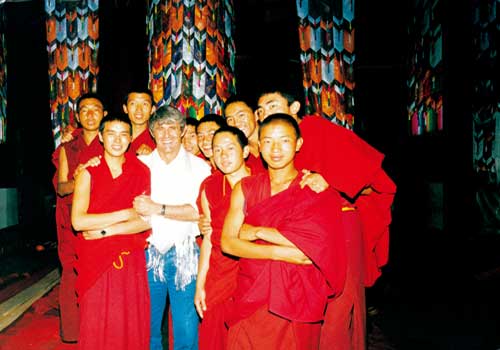
Group photo with the monk fans when coach Milou visited the monastery in Lhasa.Photo by Sochung.
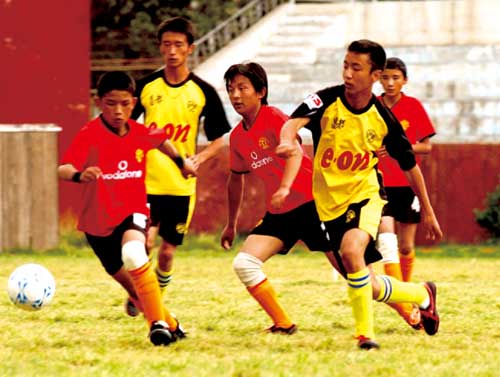
On August 3rd,2003,the teenage football champion (under 13 years) was held in TAR.team and Chamdu team.
In general view, people always believe that the "roof of the world" at 4000 meters above sea level would never have any connection with football. However, the fact is that football is no less popular in Tibet than it is in any other place. Particularly in recent years, on the snow-capped plateau, the residents increasingly love football. An ordinary football match can attract a big group of fans. Whenever weekends or holidays come, the playgrounds at school campus are fully occupied by young people. Sometimes people have to queue up.
The question is when was football introduced to Tibet? Were there similar sports in Tibet in ancient times? In reality, it is quite hard to give a precise answer. For example, anything resembling balls is called "ball" in English; the Tibetan equivalent is "polo". Today, Tibetans still take the word "polo" to refer all kinds of balls. Therefore the relationship between Tibet and football is not a simple story.
The Football Team in the 20th Century
Materials that we could access informed us that modern football began in the 20th Century. In Tibetan history, the first formal football competition took place at Gyantse in 1913 between a local team and a guest team from Britain. In the book entitled "Track Tibet", Patrick French records: "To those Britishers, football is their entertainment; however, the Tibetan local team of 10 people, calling themselves 'Lhasa United', dared to challenge the Britishers. Five out of ten were young Tibetan autocrats, including the famous persons Yuthok and Taring; three were the people from Ladakh, and two, one was a tailor from central China, and the other was a soldier from Nepal. The British team was composed of four men and their servants. The match finally ended with a one-score advantage to the Englishmen. "The author concluded: "This was the highest altitude match to take place in the world. "
Up to 1920, Tibet had already formed many football teams. The most outstanding ones were Lhasa United, Potala Team, Tashi Team, Guard Team, and Delhapuchu Team. They have held many matches. And the Potala Team, consisted of many young autocrats who usually went to the hinterland to have competitions during the 1950s. They often took cameras with them which made others from the hinterland envious.
Popularity and Development of Football in TAR
In the 1950s of the 20th Century, football was popular amongst young autocrats and classified as an entertainment of the upper class. However, since the democratic reform, football had gradually become the sport of ordinary people in TAR.
During this period, it was easy to see that school children and youths were playing in the schoolyards or playgrounds of townships. In March of 1960, Tibet formed a teenage football team and took part in the regional competition of the national tournament in August in Chong Qing. The Tibetan team's ranking of seventh out of a total of ten was a remarkable achievement.
In 1965, Tibetan football took part in the national Second Division in Datong, and stood out as fifth out of 15 teams. Tibetan team members were so brave and made a profound impression on their audiences.
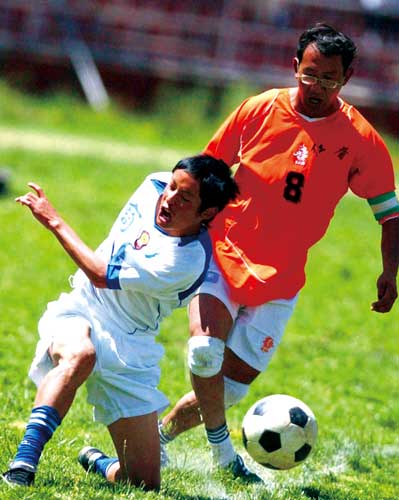
On july 10th,2005,the first football game in the system of seven-footballer games in Lhasa,consisting of 300 footballlers in 24 teams.The photo shows the footballers are struggling for the ball.
The league matches ceased with the outbreak of the "cultural revolution". The Tibetan football team also gave up its regular training, and in turn the team members had to give up their football careers. What a big loss! Many were sad about this, and it is said: "if it was not happened, Tibetan football team might have come to be an outstanding team in China".
At the end of 1974, Ji Zhiyang, the coach from the national team of China, came to Tibet on a national support program from the hinterland. He believed that the Tibetan team was good at comprehensive capacity and strength. He said: "Tibetans have great stamina; but they are light weight with small figures, which gives them less capacity on explosiveness. Of course, that is the biggest obstacle for development of Tibetan football. "
While the professional development of football is restricted, football at community level tends to be highly popular. The playgrounds at downtown and school campuses became the basis of football development. For example, only in Lhasa, there are over ten football teams in the community. Every weekend, all stadiums in Lhasa are fully occupied for self-organized football competitions.
Football in 1980s
The Tibetan football team accomplished reasonable achievements in the 1980s, but they mainly relied on coaches and team members from the hinterland.
In February of 1982, the Tibetan team had five matches with four wins and one draw to reach second place in the spring football invitational tournament held in Nanning of Guanxi province. In April, the team won the first of six matches in the invitational tournament taken place in Mei County of Guangdong - the hometown of football.
In 1984, the team won the Championship in the second "United Cup of Ethnic Groups".
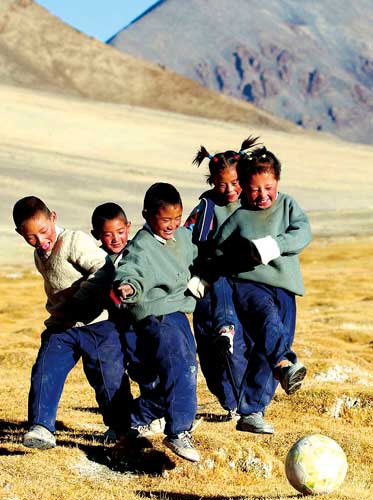
Tibetan kids are kicking the ball on the grassland in Rutok County of Ngari Prefecture(over 4300 meters high).

Tibetan teenagers are playing ball on a field at an elevation of 3800 meters,
close to the relics of Guge Kingdom in Zhada County of Ngari Prefecture.
In April of 1985, the Tibetan football team of China joined the sixth "Anfa Cup" in Nepal and won second place with three wins, one draw, and one loss.
In August, with a score of four to one, the Tibetan team won the Championship in the third "United Cup for Ethnic Groups", and the team member Zhao Jianping was rewarded as most excellent striker due to successfully shooting five goals.
In 1987, the team was reorganized (because many team members from the hinterland went back home) to form a new team consisting purely of Tibetans. However, the team did not give good performances.
With professional support and influence from the Tibetan football team, those non-professional teams in the community tended to be standardized. In the league matches organized by the Sports Committee of Lhasa Municipality, over twenty non-professional teams jointed the competition.
Influenced by the vigorous growth of professional league matches, Tibetan football, having fallen behind others, has also established its football clubs even through the performance is not satisfactory.
In April of 2004, Zhang Yuliang, the coach, led a Tibetan team to Beijing to form the Zang Yin Xue Quan Club. The club represented the Tibetan Autonomous Region (TAR) to participate in the Second Division, but was a failure and washed out.
In 2003, the Sports Bureau of TAR cooperated with Beijing Hui Tong Lu Hua Vehicle Selling Co. Ltd. to form "Tibetan Hui Tong Lu Hu Club", and represented TAR to take part into the Second Division, but due to various reasons, it lost the opportunity to compete. In 2005, the club tried to break through to the First Division, and eventually failure. In January 1st, 2007, the club announced that the football team was settled down at Henan Province.
Football is popular in the community not only in Lhasa, Shigatse, and other big cities, but also in Rishong Township of Ritu County in Ngari??the border area between China and India. We saw Tibetan children were chasing a football at the roadside; they looked sweaty but full of vim and vigor. They were competing against each other without any retreat when they shot the ball into a goal, constructed from school bags.
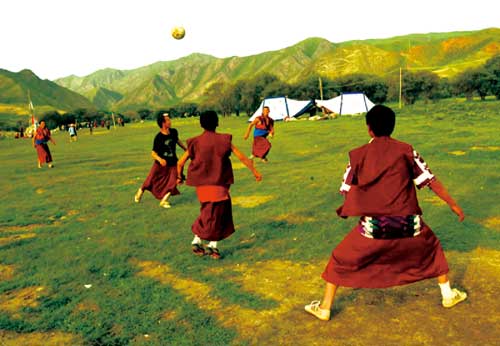
Young monks are kicking the ball during their leisure time.
However, the youth in cities organized their own teams to regularly organized contests, and even monks from Jokhang and Sera Monastery have formed their own football teams. Various football teams maintain formal training programs and invite coaches to assist them, too. They discreetly design team members' different positions to function in a professional way, such as striker and goalkeeper. No matter if the weather is cold or hot, their training program is never halted.
In accordance to the introduction of TAR's Sports Bureau, TAR established its football association several years ago, and is preparing to organize a team to participate in national competitions in coming years. Tibetan people are not only in good health for football contest but also extremely fond of football. Their dietary customs are suitable for football competitions. Based on the data provided by sports institutes, 70 percent of Tibetans boys in middle schools are fond of football, which therefore becomes the reserves for football's development in Tibet. It is believed that, in a long run, football has prosperous future in Tibet.